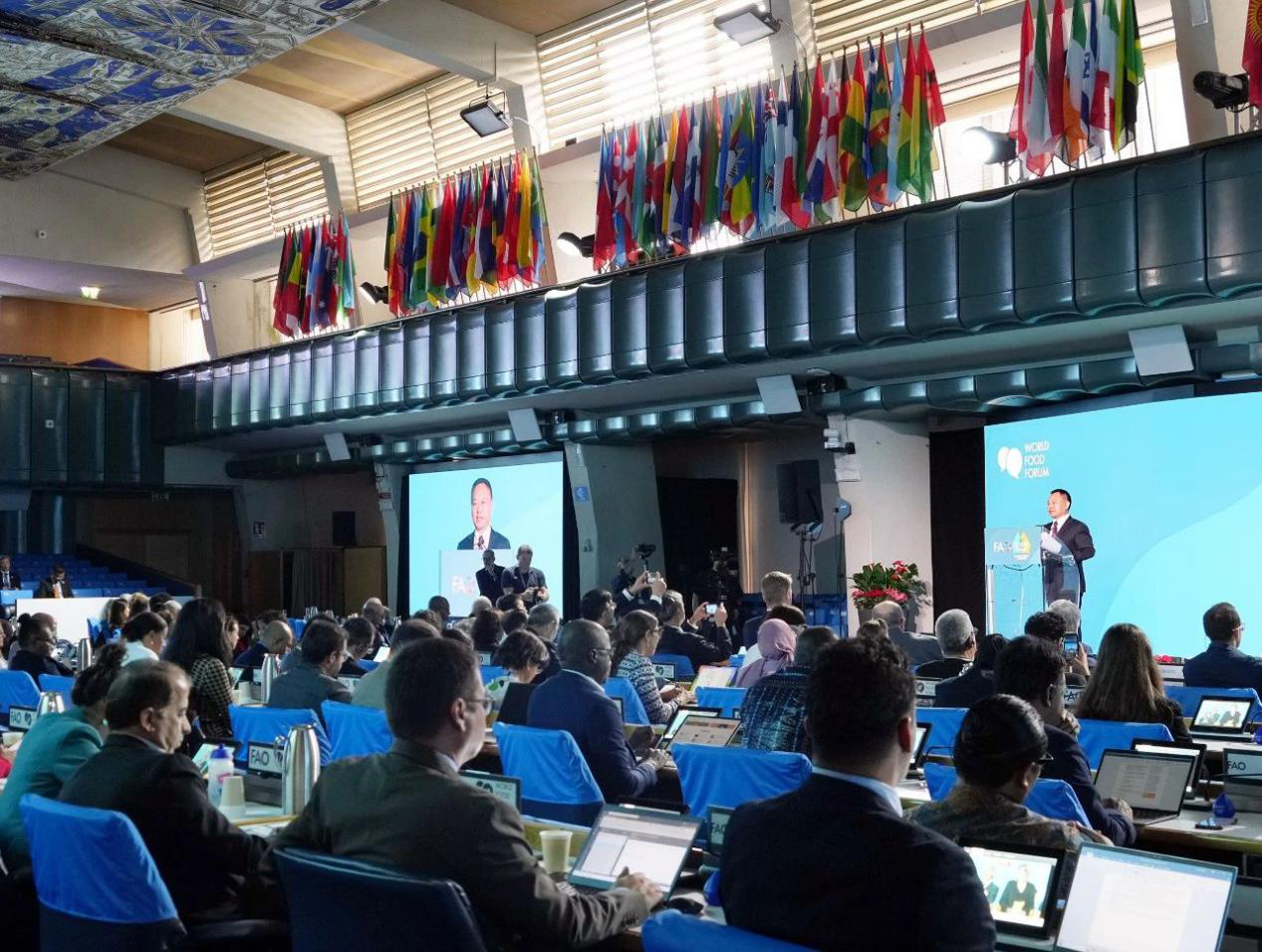
On October 17th, 2024, the Food and Agriculture Organization of the United Nations convened the High-Level Rome Water Dialogue on the Global Framework on Water Scarcity in Agriculture. Mr. Li Guoying, Minister of Water Resources, attended the meeting and proposed the Initiative of Five Systems on establishing and improving water conservation and efficiency in agriculture.
Li Guoying noted that China’s unique geographical and climatic conditions determine that water resources are the lifeline of agriculture. In recent years, Ministry of Water Resources of China has thoroughly practiced President Xi Jinping’s water governance principles of “prioritizing water conservation, balancing spatial distribution, taking systematic approaches and promoting government-market synergy”, thus improving the guarantee capacity of water resources for grain production. Firstly, efforts are spared to develop modern irrigation zones. Through establishing the national water network and prioritizing the overall pattern of water allocation, numerous modern irrigation zones have been newly built and upgraded. Secondly, endeavors are made to promote water conservation and efficiency in agriculture. The strictest system of water resources management has been practiced to boost the reform of agricultural water pricing, the trading of water use rights and the development of water-saving technologies. Thirdly, efforts are made to strengthen the scientific and technological capacities of irrigation zones. The development of digital-twin irrigation zones has been proactively carried out, thus rendering supports to agricultural water users in implementing scientific irrigation practices. Fourthly, endeavors are committed to improve disaster prevention and mitigation capability in agriculture. The impact of flood and drought disasters on agriculture has been minimized by means of setting up and improving the basin-based flood control engineering system, precipitation monitoring and forecasting system, flood and drought disaster prevention system, among others.
In order to effectively cope with complicated changes of global water resources, Li Guoying raised the Initiative of Five Systems on establishing and improving water conservation and efficiency in agriculture based on China’s practices and experience.
Firstly, establishing and improving a scientific irrigation institutional system. It is necessary to formulate scientific irrigation system and quota according to the biological characteristics of crops and the regularity of water demand.
Secondly, establishing and improving a water use metering and monitoring system. It is needed to upscale the coverage, accuracy and practicability of agricultural water metering and monitoring, so as to provide supports for strengthening the management of water demand in agriculture.
Thirdly, establishing and improving an agricultural water pricing policy system. It is crucial to complete the scientific and reasonable water price formation mechanism, so as to curb unreasonable water demand, guide water-saving irrigation and attract social capital to invest in the construction and management of irrigation zones.
Fourthly, establishing and improving a water-saving market institutional system. It is important to accelerate the market-oriented trading of water use rights and improve the incentive mechanism of water conservation, so as to stimulate the water-saving enthusiasm and initiative of water users in agriculture.
Fifthly, establishing and improving a water-saving technology and service system. It is significant to promote cross-cutting and applicable water-saving irrigation technologies and implement professional guidance, so as to provide convenient services and improve efficiency level.
Leaders from water and agriculture departments of relevant countries and international organizations attending the meeting expressed appreciation for China’s experience in improving grain production through water projects, spoke highly of Li Guoying’s Initiative of Five Systems, and sincerely hoped to gear up exchanges and cooperation with China to jointly make more contributions in the realization of the agricultural and water-related goals of the UN 2030 Agenda for Sustainable Development.
The High-Level Roma Water Dialogue aims to share policies, technologies and experiences of all countries in tackling water scarcity in agriculture. Mr. Qu Dongyu, Director General of FAO, attended the opening ceremony and delivered welcoming remarks. The Rome Declaration on Water Scarcity in Agriculture was unveiled to call on member states to support FAO’s initiatives, push forward water conservation and efficiency in agriculture, and scale up international exchanges and cooperation to address water scarcity in agriculture.
Source: INTCE